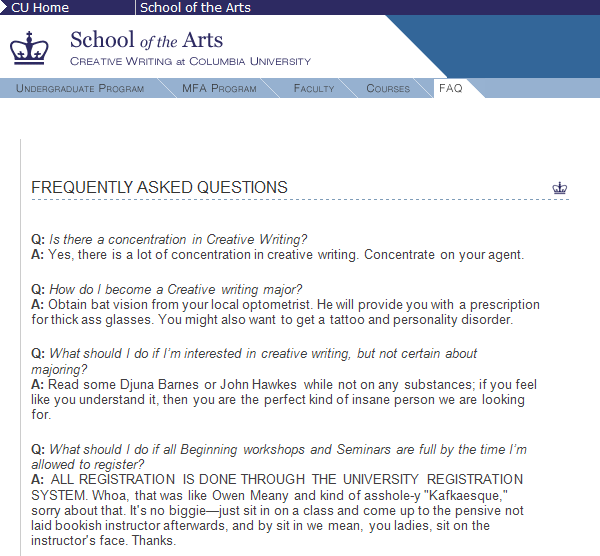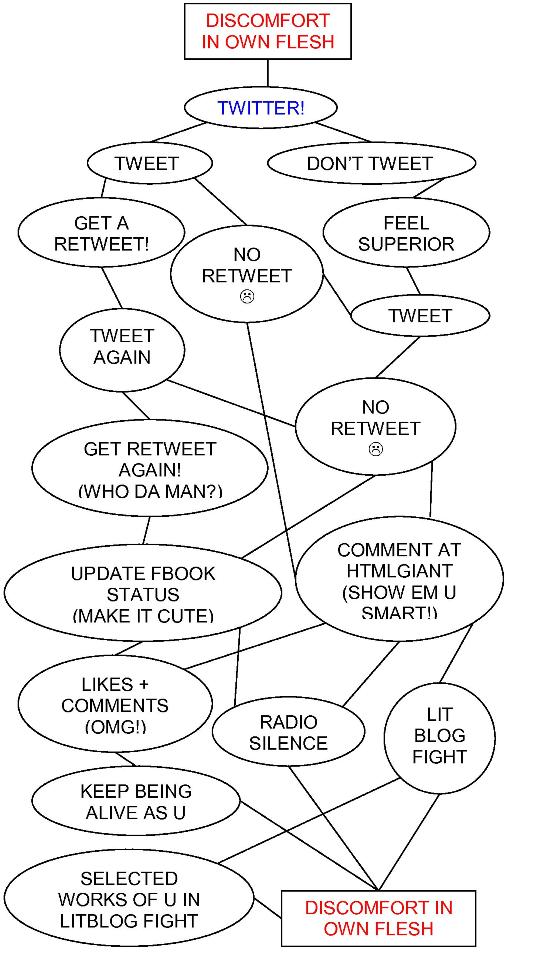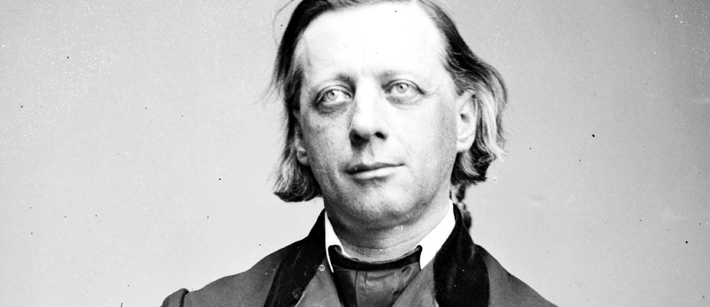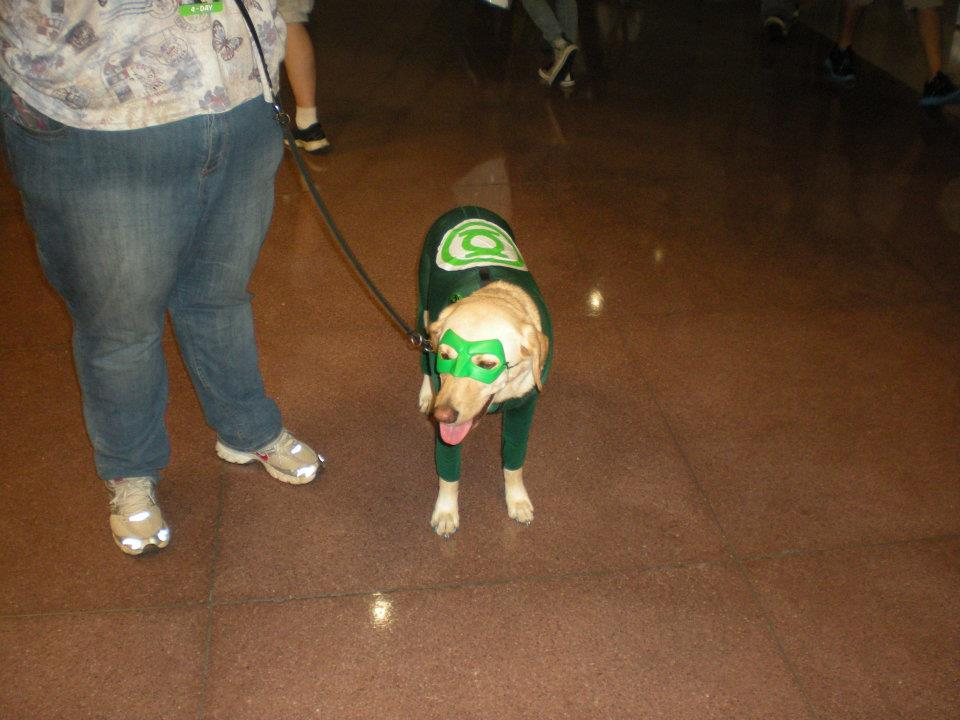Let’s say someone cares enough about you to write your biography. Title it: this is fantasy anyway, so why not have fun?
INTO THE MORNING
if i craned my neck i saw them slowly begin to turn away, he said, a dream of course, the scatter of events, the scatter of events is amazing when seen from above, he said, the scatter of events, and how every new day we wash, dress, have washed, have dressed, this torture till we have finished washing, dressing, and how we can’t bear being talked to in the morning, he said, could this not go so far, he said, that we’d no longer want to set foot into the morning, he said, at least from my post of observation, he said.
(Friederike Mayröcker, with each clouded peak)
 i can’t stop thinking about this sentence. i can’t help but think this sentence is perfect. i was drawn to it because the day before i read it i had the same revelation about not wanting to set foot into the morning, about the torture of beginning, what it means to enter the day, and what is left behind when you enter. what is that moment? the one where you choose to step into the morning even though you know that the choice to begin is also a turning away from your dreams. the scatter of events. rhythm and repetition; ritual and repetition. the sentence lit up when i wrote it down. the scatter recurs in the sentence; the sentence accumulates and places you in time in all these different ways. not a straight path from one point to another, but a cluster of rivulets that flow in all directions. you are watching. you wait, have waited. you move between states of anticipation and retrospective contemplation, between the diurnal ritual of dressing and washing, the impending task before us (till we have), the moments after the dispersal, when the sediments have settled, when we have finished…have washed, have dressed. the appearance of simplicity. sentence is movement, an unfolding in time. yet while my eyes move from the first word to the last, something is happening in between. a temporal upheaval under the guise of linearity (the guise being the sentence itself), perhaps. a gesture toward a different way of entering the sentence.
i can’t stop thinking about this sentence. i can’t help but think this sentence is perfect. i was drawn to it because the day before i read it i had the same revelation about not wanting to set foot into the morning, about the torture of beginning, what it means to enter the day, and what is left behind when you enter. what is that moment? the one where you choose to step into the morning even though you know that the choice to begin is also a turning away from your dreams. the scatter of events. rhythm and repetition; ritual and repetition. the sentence lit up when i wrote it down. the scatter recurs in the sentence; the sentence accumulates and places you in time in all these different ways. not a straight path from one point to another, but a cluster of rivulets that flow in all directions. you are watching. you wait, have waited. you move between states of anticipation and retrospective contemplation, between the diurnal ritual of dressing and washing, the impending task before us (till we have), the moments after the dispersal, when the sediments have settled, when we have finished…have washed, have dressed. the appearance of simplicity. sentence is movement, an unfolding in time. yet while my eyes move from the first word to the last, something is happening in between. a temporal upheaval under the guise of linearity (the guise being the sentence itself), perhaps. a gesture toward a different way of entering the sentence.
The Marbled Swarm swarms now
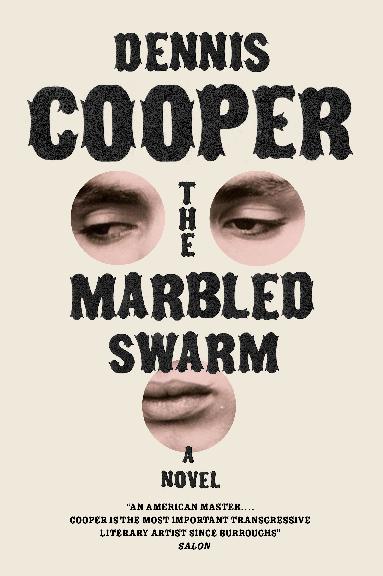
Today is the release of Dennis Cooper’s latest, The Marbled Swarm, and it’s truly something else, even for someone you expect to knock your head off every time.
I reviewed it here for Fanzine; Ken reviewed it here on HTML.
You can buy it now.
The Collaborative Workshop

A few years ago, when I moved from L.A. to Kansas and began my dizzying transition from grad student to faculty member, I dug out of my closet the stacks and stacks of workshop manuscripts of my early efforts. There they were: fifteen copies of every lousy draft I’d produced, each decorated with marginalia and scribbled endnotes. Sometimes whole paragraphs were blacked out, as if my classmate were an overzealous FBI agent releasing my story under the Freedom of Information Act. Sometimes a poignant protest “No!” would appear to tumble through the white space, alongside a disappointed “You know better!”
Some of these notes were ten years old, but as I looked at them again, the nausea was fresh in my throat. There were hundreds of these, representing my years in an MFA and then a PhD program, contradicting each other in a cacophony of criticism and praise, some written by people whose faces for the life of me I could not remember. It took several trip down two flights of stairs and across a parking lot, but I tossed them all into the apartment complex dumpster. Good-bye to all that.
{LMC}: Beecher’s One
The first thing you will notice about Beecher’s is the design and production–clean and elegant. The spine is bound with black thread. The pages are thick, linen, creamy, the grain of it holding the ink to the page.
Introducing a video about the debut issue, the editors said, “Beecher’s One was designed to give the text inside primacy, and as well record the reader’s tactile interaction with the physical magazine. The layout is straight-forward, and the text is presented simply in a black serif font on white paper. The physical object, with a naked spine and rigid, toothy, absorbent paper is meant to show evidence of the reader by literally absorbing and recording the reading experience: the hands holding the book, the fingers on the page, the bending of turned pages, the weakening of the unprotected spine.”
Reading Beecher’s is, indeed, a physical experience that openly acknowledges and engages the reader. This is a magazine that wants to develop a relationship with readers and writers. In this, and other regards, Beecher’s succeeds beautifully. The writing showcased within the magazine’s pages is as engaging as the design and production. Contributors include Rebecca Wadlinger, Alec Niedenthal, Joshua Cohen, Rhoads Stevens, John Dermot Woods, Phil Estes, Creed J. Shepard, Lincoln Michel, John Coletti, Yelena Akthiorskaya, Colin Winnette, Dana Ward & Stephanie Young, James Yeh, Alexis Orgera, Rozalia Jovanovic, Ricky Garni, and Justin Runge as well as interviews with Stephen Elliott and Adam Robinson.
A short film by Ellen Frances
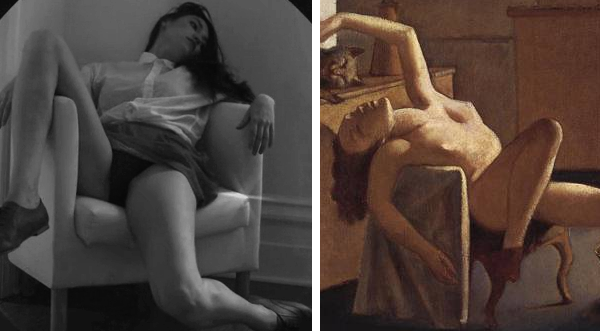
Ellen Frances, director and subject of her short film “Very Beautiful Woman” (2011, Pangur Ban Party) may well be aware of the evocative poses from which hers are derived, or not. Balthus (1908 -2001) has been criticized much for his erotic depictions of underage girls, often struggling in compromised and subordinate positions. Men may offer other men more to look at, but it takes a women to turn it into something formidable. I had to increase the RGB input level in the pic — to fill that room with light, virtually, miles away — to confirm that the dark patch between her legs were indeed panties and not the unkempt bounty of a more natural sort. I only speak so glibly in faith that my inclinations are at first respectful. Frances frames herself inside a cosmetic blush mirror, at first held in her hands, then in what is made to appear as a larger mounted wall mirror — the repeating circular motif functioning as a distancing viewfinder of some sort, lending a layer of documentary mediation and self-cognizance. With Cindy Sherman, Vanessa Beecroft [‘s subjects], and perhaps Miranda July, Frances stands in the company of women who have found ways to negotiate the expectations of their bodies without looking away.
The Vicious Red Relic, Love
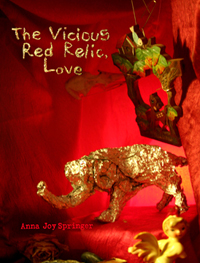 The Vicious Red Relic, Love
The Vicious Red Relic, Love
by Anna Joy Springer
Jaded Ibis Press, 2011
202 pages / $26 Buy from Jaded Ibis, Buy from Amazon
– from The Vicious Red Relic, Love
There are people like me who follow one animated, gluttonous moment of emotional experience to the next in total anticipation and ecstatic fervor. Rolling our tongues and pawing at the door with melted acrylic talons. Total fandom found in the exquisite rapture received via all forms of stories, triple-bound puzzle pieces pressed into our skin ‘til it puckers and marks. We are gauchely overly thankful, always looking to add one more jewel in a beguiling ancient crown, clamoring at the outskirts of that literary valley in hopes of pining our way back in.
October 31st, 2011 / 12:30 pm
Reading Comics: Salvatore Pane Goes to ComicCon
Welcome to the fifth installment of my new series: Reading Comics. I’ve still got a bunch of great contributors lined up, but I’m also looking for more voices. If you’d like to contribute just email me and let me know! Without further ado….here’s Salvatore Pane…
The Strangest Moment of Your Life: My Trip to New York ComicCon
I’ve only been to two comic book conventions in my life. The first was in 1995 in a Holiday Inn lounge in Scranton, Pennsylvania. I was already an avid comic book reader and had a dedicated shop that handled all of my purchases. I went to the convention mainly to ogle the Star Wars collectible game cards. I played every day after school with my friends, and my chief tactic was putting IG-88 in an AT-AT and setting him loose on the sand dunes of Tantooine, a bit of universe defying logic I thought was both hilarious and charming. Two weeks ago I attended my second convention, New York ComicCon. I thought I knew what to expect. I’d seen coverage of San Diego ComicCon, NYCC’s more movie obsessed older brother, the familiar news clips of people strutting around conference halls dressed like Comet the Super Horse or Ego the Living Planet, clipped footage of the men and women of tomorrow here today in tight fitting spandex every color of the rainbow. I followed the comic industry via fan sites like Newsarama and iFanboy ever since I took a graphic novel course in college and discovered that bam, pow comics weren’t just for kids anymore. They were aimed at me. The nostalgic twenty-something who wanted to re-consume the tales of their youth. Trade paperback editions of Amazing Spider-Man and Daredevil sat perfectly on my shelves next to hundreds of hunted down Nintendo Entertainment System games and mostly unwatched DVD collections of Ducktales and Teenage Mutant Ninja Turtles. This rekindled interest in the preferred storytelling medium of my childhood led me to try my hand at writing comics. As I spent mornings working on prose, trying so hard to be literary, I spent nights in a world of joy and wonder, scripting rooftop scenes of madcap adventure. My best friend Mark and I co-wrote a comic, and it was accepted for publication. He was the one who suggested we go to NYCC, and as we drove across Pennsylvania and into New York City proper, I kept thinking about AWP. It had to be similar, right?

